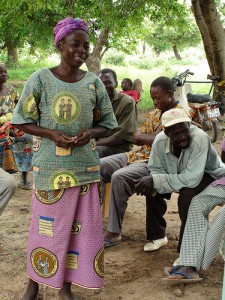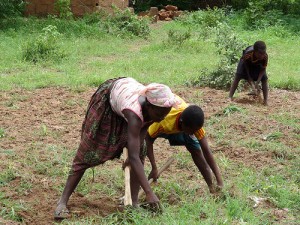What do Victoria’s Secret and Monsanto have in common? They’re both interested in growing cotton in Burkina Faso.

Victoria’s Secret is interested in organic cotton, grown by women farmers working with Helvetas—a Swiss NGO– in rural communities outside of Ougagoudou. Monsanto, on the other hand, is focused on growing Bt cotton—cotton that has been genetically engineered with a bacterial protein that is supposed to deter insects, as well as reduce the need for expensive pesticides, according to the company.
Burkina is the leading cotton producer in Western Africa, but annual yields have decreased the last few years, along with prices, leaving many farmers destitute.
In order to help reverse this trend, in 2004, Helvetas started working with 50 farmers, training them about organic methods of production. “It’s easy to start with cotton to introduce the concept of organic,” says Pierluigi Agnelli, Director of Helvetas Burkina Faso.
But, he adds, many farmers didn’t believe they could grow cotton without pesticides and they had to be convinced. Helvetas worked with them, showing them how to compost and use natural pesticides and “over time,” says Agnelli, “they saw it worked.”
Helvetas helped the farmers form a cooperative of organic producers and started expanding their trainings into other communities. Today they work with roughly 7,000 farmers, nearly half of them women. Women don’t traditionally grow cotton because of the toxicity of the pesticides, says Agnelli. But now, in addition to tending kitchen gardens, women are also growing cotton and getting extra income, which they’re using for things like sending their kids to school or buying bicycles for transportation—things they couldn’t do without the extra income.
“For us,” says Agnelli, “it’s important to promote organic because farmers are interested in it.” And so is Victoria’s Secret. In 2007 the National Union of Burkinabe Cotton Producers (UNPCB) signed an agreement with Victoria’s Secret to purchase 600 MT of organic cotton. The company continues to source most of the organic cotton it sells in the United States from Burkina Faso for their collection of organic panties.

Monsanto says it’s concerned with increasing cotton yields, while also increasing farmer income. The multinational agribusiness partnered with the Burkinabe government and local researchers to start producing Bt cotton seed in the country in 2008.
Burkina Faso is one of only two countries in Africa growing genetically engineered cotton. Monsanto’s research in the country shows that their Bt cotton yields 30 percent more than conventional varieties and needs fewer treatments with pesticides.











